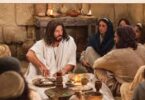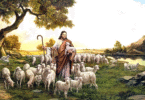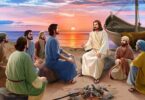26th Sunday of Ordinary Time (Year B)
Scriptures: Num. 11:25–29; Ps 19:8, 10, 12–13, 14; Jas. 5:1–6; Mk. 9:38–43, 45, 47–48
Once a fisherman was selling crabs at the fish market. He had two buckets of crabs. He covered one bucket and the other he had left open. A curious lady inquired about the different treatments given to those two buckets. He pointed out the covered bucket had Japanese crabs whereas the open bucket had local crabs. She did not understand it so she asked him to explain the difference. He explained that the local crabs do not allow any crab to move out of the bucket. If one tries to escape, then the others pull it down, but it is not in the case of the Japanese crabs. If you keep the bucket open, then they help one another to escape. The Japanese crabs never suffer from jealousy. Where there is jealousy, there is confusion and evil.
It is said among all the sins, jealousy is the only sin that brings pain in the life of man. It never allows them to live in peace. The bible narrates many stories of jealousy. Cain murdered his brother Abel out of jealousy. He did not like God accepting Abel’s offering (Gen 4). Jacob’s sons were jealous of their brother Joseph. They tried to kill him but ultimately, sold him to some travellers (Gen. 37). King Saul was jealous of David for God had anointed David as the next king. Saul wanted to kill David so he chased him till the end of his life (1 Sam 18). The older brother was not happy when his father received the prodigal son. He was displeased at his father’s mercy (Lk 15). All these stories remind us that jealousy was prevalent all through the history of humanity. It killed the relationship between them. It did not help them for any better.
Today’s liturgy helps us to learn an important lesson on jealousy. The first reading from the book of Numbers narrates an incident in the lives of Moses and Joshua. The people were grumbling at Moses. He pleaded before God that he had become tiresome to guide the people of Israel. God decided to share his gifts of the Spirit to the seven elders of the community. He had summoned them to the tent. However, Eldad and Medad did not enter the tent but received the Spirit of the Lord. They began to prophesy in the name of God; however, Joshua was annoyed. He wanted to stop them. It was the jealousy that made him behave spontaneously against the will of God. Moses refused to listen to Joshua and challenged him that the spirit and the gift of the Lord are not reserved only for him.
The Gospel narratives also remind us of the same theme. Joshua’s role is played by John. He complained against a man who was driving out demons in the name of Jesus. He even tried to stop him from doing so because he was not belonging to their group. Jesus like Moses reprimands John and teaches him that whoever is not against us is for us. Jesus reminds him that it is God who in his mercy had blessed the man with the gift of exorcism. John was jealous and angry that some outsider was casting out demons in the name of Jesus. As a matter of fact, the disciples were not able to cast a demon from a young boy (Mk. 9:14). The disciples were jealous that they could not do it but someone from outside was able to cast demons in the name of Jesus.
It is interesting to learn lessons from Moses and Jesus. They taught the young Joshua and John the most important lessons for life. 1) They should not concentrate on others for their blessings but they must pay attention to themselves when it comes to chastisement. Instead of cutting people from their actions, we need to cut ourselves from selfishness. 2) They need to celebrate the blessings of others. Jesus says, whoever is not against us is for us. The one who cast the devil is a friend of God. We need to collaborate with one another. We need to celebrate his success instead of stopping them from doing it. 3) Give others what you have and it will bring joy in your life. St. James talks about the rich who worked only for themselves. It was a burning fire that they stored in themselves for their last days. 4) They made them realise that they need to be grateful to God. God had provided the people of Israel the food and water in the wilderness. Jesus had given them the most beautiful experience of the Kingdom. But they were more interested outside than the very presence of Moses and Jesus.
We are called to be people who have overcome jealousy like Moses, Jesus and St. James. Even the Japanese crabs know the effects of jealousy. The jealousy brings pain, confusion and every pain. The generosity, kindness and benevolence brings joy and happiness. Let us pray during this holy Eucharist that we may cut off jealousy and grow in joy of Christ.






